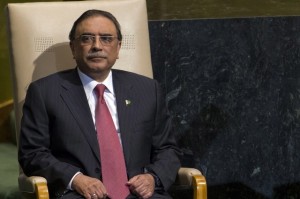With aid, it’s never a case of no strings attached

Pakistan’s former president Asif Ali Zardari lamented to the BBC that his country had suffered greatly because the US failed to release “$50 billion” in aid. Ray Stubblebine / Reuters
When Israel’s prime minister, Benjamin Netanyahu, met US president Barack Obama at the White House this week for the first time in more than a year, it unwittingly served as a timely illustration of the inherent problems and limits of foreign aid.
Like Israel itself – one of the single largest recipients of US foreign assistance since it was founded in 1948 – aid-giving is often intrinsically selfish. It could be meant as an investment in the well-being of a domestic constituency and/or used as a way to buy foreign influence. Sometimes the close-focus means neither aim is properly achieved. This is arguably the case with US aid to Israel. Even though it was enormous – nearly a tenth of the $35 billion (Dh128bn) America gave overseas in 2014, and three times as much as poor Afghanistan received – it may soon rise by another $1bn a year.
The US-Israel aid relationship, of course, is sui generis in all sorts of objectionable ways and “diverts funds from the support of human life elsewhere”, as Adlai Stevenson memorably pointed out in the US Senate 35 years ago. But the value and utility of foreign aid overall is worth examining in the context of a new report by AidData, a research lab in Virginia.
The organisation, which collects and publishes data on trillions of dollars of aid from 90 agencies, questioned nearly 7,000 development policymakers and practitioners in 126 low- and middle-income countries.
It found that aid dispensed through multilateral institutions, such as the World Bank, gets better results, mostly because it is seen as less tied to a single donor country’s strategic or trade interests. Some small donors, such as Taiwan and Luxembourg, also got decent results, possibly because they stuck to helping in sectors they knew well. But the US, which spent $207 billion on development aid between 2004 and 2011, was not as effective as it should have been. Other big donors – Japan, Germany and France – were even more ineffectual. Bradley Parks, a co-author of the AidData report, concluded that “supranational institutions are often seen as ‘honest brokers’ ”.
This has an important implication in what the report calls a crowded development bazaar “teeming with bilateral aid agencies, multilateral development banks, civil society organisations and think tanks competing for the limited time and attention of decision-makers”.
The findings suggest that if they are to be truly effective, Washington, London, Paris, Berlin and others must turn over their annual aid allocation to multilateral institutions. But that’s only if they really want to achieve the declared objectives of their donations.
Do they? Or is foreign aid still meant primarily to influence the political judgements of recipient countries as in the Cold War era and any programmatic measures that help their socio-economic and political development are merely a bonus?
AidData’s findings suggest that this is what most recipients believe, even though it has been a decade since the world’s champion aid-givers and takers came together at the first High Level Forum on Aid Effectiveness organised by the OECD in Paris to solemnly agree key changes to the process. No longer, they averred, would aid allocation be led by donor priorities and through donor channels. Developing-country governments would be helped to formulate and implement their own development plans according to their national priorities.
Those were hopeful times. It was the countdown to the 2005 G8 summit in Gleneagles, Scotland, and there were plans to write-off everything the highly indebted poor countries owed, and global campaigns such as Make Poverty History were in the spotlight.
Yet, in the years since, Pakistan, Zimbabwe, North Korea and Myanmar, among others, have individually rejected aid with the biting criticism that it came with “strings attached”. Of course it did. That foursome may be easily offended, but their objections to the proffered assistance are still noteworthy because they underline the extent to which it is perceived as skewed and ideologically driven. Those are precisely the reasons single-donor aid becomes less effective.
Even so, the hope lingers that aid will be the great impartial deliverer. Last weekend, Pakistan’s former president Asif Ali Zardari lamented to the BBC that his country had suffered greatly because the US failed to release “$50 billion [in aid] … a Marshall Plan for Pakistan” in 2009. It may be expedience or Mr Zardari’s memory is failing because the US government was not offering Pakistan much at the time but the Kerry-Lugar Bill. This passed into law a year later and was the first American aid package to Pakistan advertised as “no strings”. As president, Mr Zardari hailed it as Pakistan’s largest injection of non-military aid because it pushed $6 billion through to new schools, hospitals and microfinance schemes. But his army – along with most of Pakistan’s political class – was suspicious of some of the reporting requirements. An aid package that might have been a supply line of hope for Pakistan did not achieve much.
This issue is mostly to do with politics and perceptions rather than intention and resources, and it is particularly relevant today in the context of the onrush into Europe of migrants from the Middle East and Africa.
The European Union is working on boosting aid to the countries that are haemorrhaging refugees and to those in the geographical neighbourhood that might be able to take them. It is a valid response unless it seems designed only to pass the Nimby (“not in my backyard”) test and serve as an advocacy tool to keep migrants from entering Europe’s physical space.
That’s when aid gets so politically fraught it’s best not spent at all.

